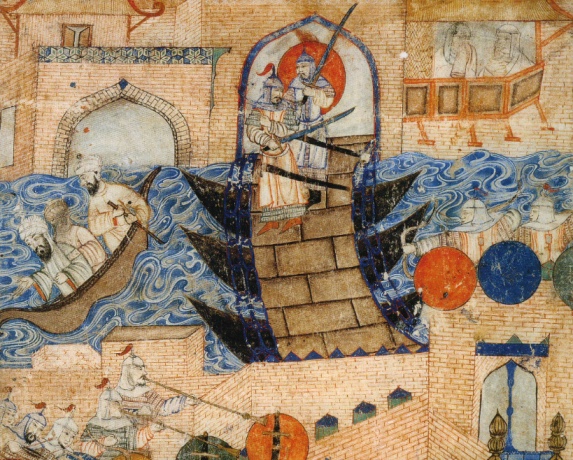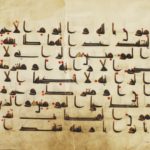
The following are some general illuminations about the texts of the historiographers. In the Islamic heritage the account of wars and invasions were written by the victors and, moreover, by those in the ruler’s entourage. As such they were oblivious to the atrocities committed by the ruler’s commanders: their looting, depredations, enslavement and transgressions on the sanctities of the defeated country. In highlighting the victorious leader the historians write that his war was a victory for the word of God, for Islam and for His prophet.
BY YUSUF YUSUF
AS FOR THE HISTORICAL narrative on scientific, literary and cultural progress in Islamic lands, from the Rightly-Guided Caliphate through the Umayyad dynasty, then the ‘Abbāsid era and beyond, the palace preachers narrated it as if it were an era of science and knowledge, one which eradicated the age of backwardness and ignorance. But they did so knowing that ignorance was still widespread among the people.
And as for the state and real situation of society, the ruler’s historians portrayed his era as one of justice, fairness and equality, oblivious to their oppression of their society. They fabricated for the consumption of others that there were no poor or needy among the common folk.
Historians worked to delude the people that the ruler was the shadow of God on earth and was to be obeyed
In addition to the historians who were contemporary to the events, many others wrote long after the time they occurred, so that facts, events and anecdotes were not based on any documents, traces or evidence. The historiography of that time was thus not a true historiography. One of the most egregious examples of this is the Biography of the Prophet by Ibn Hisham, an author who died in the year 218 AH, and his text cited by Ibn Iṣḥāq since the original was lost. There is also the Ṣaḥīḥ of al-Bukhārī who died in the year 256 AH. Note, however, that the Messenger of Islam died in 11 AH. How far, in either case, can what they wrote be seen as valid? The time gap for the Biography is more than two centuries, and in the case of the Ṣaḥīḥ over two centuries. For both works the credibility is necessarily flabby.
Greater degrees of falsification took place, as can be seen in the traditional accounts of the wars of conquest. For example, Khālid ibn al-Walīd – who murdered Mālik ibn Nuwayra and married his widow – is magnified in history as ‘the unsheathed sword of God’ in this hadith of the Prophet:
It was reported from Anas that the Prophet was the first to inform the people about the death of Zayd, Ja‘far and Ibn Rawāḥa. He said with his eyes flowing with tears: “Zayd took the flag and was martyred; then Ja`far took the flag and was martyred, and then Ibn Rawāḥa took the flag and was martyred. Finally the flag was taken up by one of Allah’s Swords (i.e. Khālid ibn Al-Walīd) and Allah gave (the Muslims) victory.”[1]
Other sources, however, have him as a murderer and a rapist:
Khālid ibn al-Walīd claimed that Mālik ibn Nuwayra had apostatized, according to reports he had received about him. Mālik had denied that saying: “I am on Islam and I have not altered or changed”. Abū Qatāda and ‘Abdullah ibn ‘Umar testified in his favour, so Khālid had him brought and ordered Ḍirār ibn al-Azwar al-Asadī to strike his neck. Khālid then seized his wife Umm Mutammam and married her. ‘Umar received notice that he had Mālik ibn Nuwayra and married his wife and said to Abū Bakr: “He has committed adultery, he should be stoned”. Abū Bakr replied, “I would not have him stoned, consider it that he has simply erred.” ‘Umar insisted: “He has killed a Muslim, so he must be killed”. “I would not have him killed” Abū Bakr insisted. “Consider it that he has simply erred” and he relented, saying: “I would never wield a sword that Allah had unsheathed for their benefit.
This is how falsified history patches up the atrocities of the warlords, simply on account of the fact that they secure the goals of the caliphs, even if they behave oppressively.
Islamists, including the Muslim Brotherhood, Al-Qaeda and ISIS and others, are making war on the world and terrorising societies, in order to turn things back to the time of the ancient Islamic Caliphate. In this context I will list just two incidents, from the era of the ‘Abbāsid state, to demonstrate the level of immorality, delirium and luxury that characterized the Islamic Caliphate at that time:
1 – Muḥammad al-Amīn – the son of Harūn al-Rashīd the sixth ‘Abbāsid caliph, took over the caliphate between 809 and 813 AD. He was a homosexual. The historians ascribe to him many miraculous qualities such as ‘killing a lion with his bare hands’. Jalāl Al-Suyūṭi writes that:
He was articulate, eloquent and highly cultured. Aside from his knowledge of poetry and literature, he was a chess lover. As al-Ṭabarī narrates in his in History of Nations and Kings al-Amīn was unworldly and was consumed by his love for his male-slave Kawthar, to whom he addressed poetry. Al-Iṣfahānī mentions in his encyclopaedic Book of Songs that one night they were lying on a rug of daffodils when the full moon shone on them. So al-Amīn said concerning his boy: “Your fair face is so like the full moon that I fancied that I was gazing at it, and not at you”.[2]
From the website Ma‘rifa I briefly cite some details of his deviant sexual life:
The Caliph al-Amīn, the shadow of God on earth, refrained from cohabiting with women, whether free or maidservants. He purchased for himself a large number of handsome boys and stayed alone with them day and night. His mother Zubayda bint Ja‘far, one of the most celebrated women of the ‘Abbāsid era, tried to endear women to her son by dressing up comely maidservants as boys and ordered each of them to cut their hair like males. She named them ‘boy-girls’. One of Caliph al-Amīn’s boys was a handsome youth named Kawthar, who had so captured al-Amīn’s heart that he was longing for him and his company, and lost his mind and heart to him.
This is one example and there are many others from the Islamic Caliphate.
2 – Al-Musta‘ṣim Billāh (796-842 AD) the last ‘Abbāsid caliph watched over the fall of Baghdad since he was a playboy who took no interest in the army. On the number of women that populated his palace at the time of the fall of Baghdad in 1258 AD, Dr. Ahmed Subhi Mansour writes:
The historian al-Hamadhānī tells of a meeting between Hulagu Khan and the caliph al-Musta‘ṣim in the caliphal palace: “Hulagu ordered that the number of the Caliph’s women be counted and the number reached seven hundred wives and courtesans and a thousand maidservants. The Caliph begged him, saying: “Let me keep my women of the household upon whom the sun and moon have never risen” – that is, his womenfolk who were permanently locked up in his palace never seeing daylight or moonlight. Naturally, Hulagu Khan dispersed them among his soldiers and commanders, after ordering his soldiers to kick al-Musta‘ṣim to death, considering that to kill him with a sword the way they slew men was too good for him.
For they are too despicable to kill him with the sword as they kill men.
Baghdad fell, and the Caliph of the Muslims was busy safeguarding his wives, female slaves and maidservants, leaving his army and his men to be slaughtered and mutilated by Hulagu Khan. This is how the Islamic Caliphate was run.
History does not always tell the truth about events and facts because the historians falsified the facts, made the oppressor the oppressed, and the oppressed the oppressor. They portrayed the liar as truthful, and the truthful as a liar. What was important was that the ruler should be satisfied with his aides and his entourage, even if they lied. Moreover historians worked to delude the people that the ruler was the shadow of God on earth and was to be obeyed and acquiesced to.

Suggested Reading
An example of how courtiers and aides flattered the ruler is how regime poets, even during times of disaster, sought to gain his approval:
During the reign of Sultan Kāfūr (905 – 968 AD), who from his origins of descent from an Abyssinian slave, became the fourth ruler of the Ikhshīdid state in Egypt and the Levant, and was the actual ruler of Egypt from 946 AD, a violent earthquake struck Egypt. One of the poets approached the Sultan and said: “Even if Egypt suffers from what has befallen it, she nevertheless dances in joy at your justice”.
One day we will see the publication of historical documents, publicly distributed, that will reveal everything we believed in as mere superstition and fraud, as collections of lies that historians have stuffed into the works and sources we have been reading, and the schoolbooks we have been studying in our educational institutions. When this happens there will be one great upheaval!
[2] Citation from an article by Amjad Karāra, in Raṣīf, no. 22.
Main image: The Conquest of Baghdad by the Mongols, in Rashīd al-Dīn’s Jāmi‘at al-Tavārīkh (1st quarter of 14th century). Note the pontoon bridges, siege engines, and the refugee on the boat, possibly a high dignitary or even the Caliph himself. (Staatsbibliothek Berlin, Orientabteilung, Diez A fol. 70)
